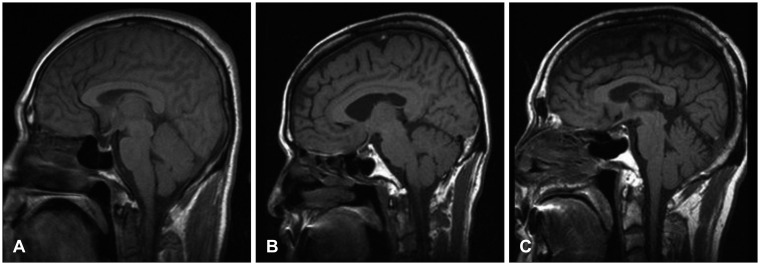Korean J Neurotrauma.
2015 Oct;11(2):139-143. 10.13004/kjnt.2015.11.2.139.
Isolated Adrenocorticotropic Hormone or Thyrotropin Deficiency Following Mild Traumatic Brain Injury: Three Cases with Long-Term Follow-Up
- Affiliations
-
- 1Division of Endocrinology and Metabolism, Department of Internal Medicine, Presbyterian Medical Center, Jeonju, Korea.
- 2Division of Endocrinology and Metabolism, Department of Internal Medicine, Chonbuk National University Medical School, Biomedical Research Institute of Chonbuk National University Hospital, Jeonju, Korea. parkjh@jbnu.ac.kr
- KMID: 2378273
- DOI: http://doi.org/10.13004/kjnt.2015.11.2.139
Abstract
- Few studies have examined the clinical features and long-term outcomes of isolated pituitary hormone deficiencies after traumatic brain injury (TBI). Such deficiencies typically present at time intervals after TBI, especially after mild injuries such as concussions, which makes their diagnosis difficult without careful history taking. It is necessary to improve diagnosis and prevent life threatening or morbid conditions such as those that may occur in deficiencies of adrenocorticotropic hormone (ACTH) or thyroid-stimulating hormone (as known as thyrotropin, TSH), the two most important pituitary hormones in hypopituitarism treatment. Here, we report two cases of isolated ACTH deficiency and one case of isolated TSH deficiency. These patients presented at different time points after concussion and underwent long-term follow-ups.
MeSH Terms
Figure
Reference
-
1. Agha A, Sherlock M, Phillips J, Tormey W, Thompson CJ. The natural history of post-traumatic neurohypophysial dysfunction. Eur J Endocrinol. 2005; 152:371–377. PMID: 15757853.
Article2. Benvenga S, Campenní A, Ruggeri RM, Trimarchi F. Clinical review 113: hypopituitarism secondary to head trauma. J Clin Endocrinol Metab. 2000; 85:1353–1361. PMID: 10770165.3. Edwards OM, Clark JD. Post-traumatic hypopituitarism. Six cases and a review of the literature. Medicine (Baltimore). 1986; 65:281–290. PMID: 3018425.4. Klose M, Lange M, Kosteljanetz M, Poulsgaard L, Feldt-Rasmussen U. Adrenocortical insufficiency after pituitary surgery: an audit of the reliability of the conventional short synacthen test. Clin Endocrinol (Oxf). 2005; 63:499–505. PMID: 16268800.
Article5. Klose M, Stochholm K, Janukonyté J, Lehman Christensen L, Frystyk J, Andersen M, et al. Prevalence of posttraumatic growth hormone deficiency is highly dependent on the diagnostic set-up: results from The Danish National Study on Posttraumatic Hypopituitarism. J Clin Endocrinol Metab. 2014; 99:101–110. PMID: 24243629.
Article6. Prieto-Tenreiro A, Diaz-Guardiola P. Isolated idiopathic central hypothyroidism in an adult, possibly caused by thyrotropin releasing hormone (TRH) deficiency. Hormones (Athens). 2010; 9:176–180. PMID: 20687402.
Article7. Rehabilitation of persons with traumatic brain injury. NIH Consens Statement. 1998; 16:1–41.8. Schneider HJ, Kreitschmann-Andermahr I, Ghigo E, Stalla GK, Agha A. Hypothalamopituitary dysfunction following traumatic brain injury and aneurysmal subarachnoid hemorrhage: a systematic review. JAMA. 2007; 298:1429–1438. PMID: 17895459.9. Schneider HJ, Schneider M, Saller B, Petersenn S, Uhr M, Husemann B, et al. Prevalence of anterior pituitary insufficiency 3 and 12 months after traumatic brain injury. Eur J Endocrinol. 2006; 154:259–265. PMID: 16452539.
Article


